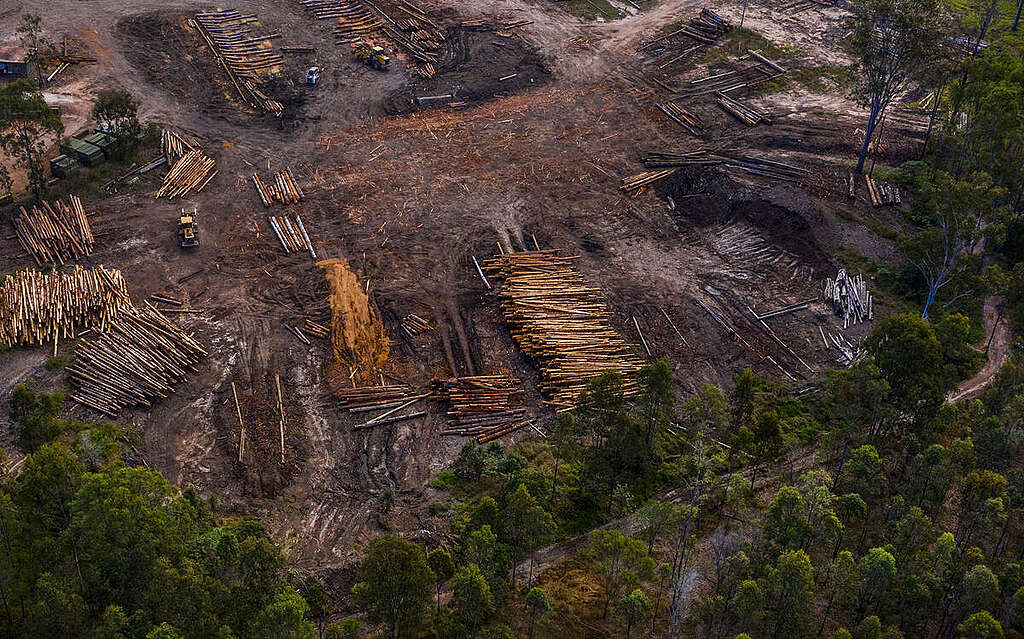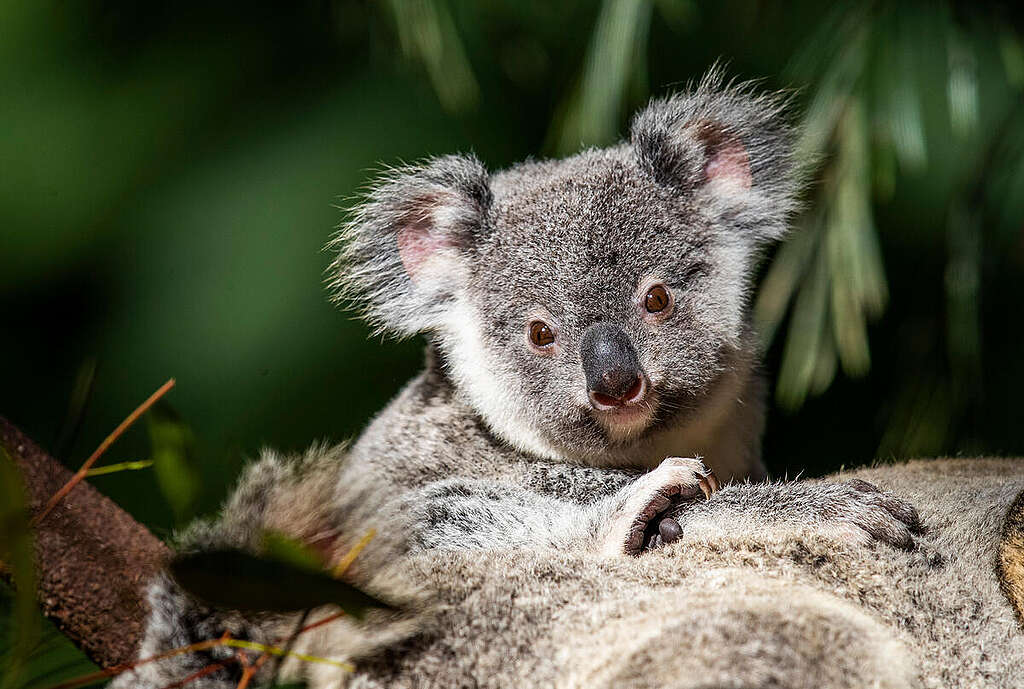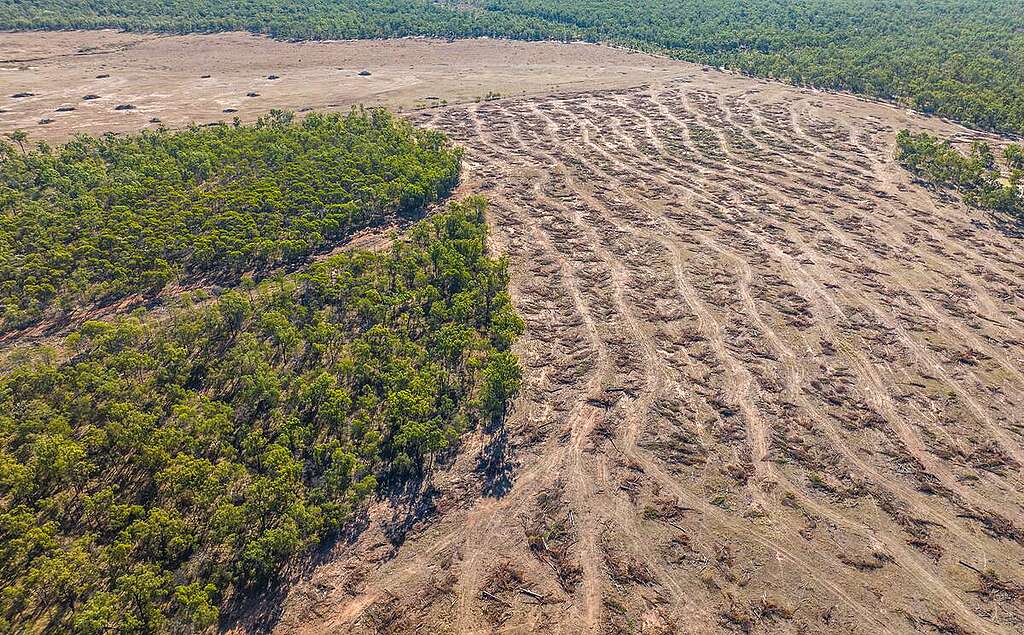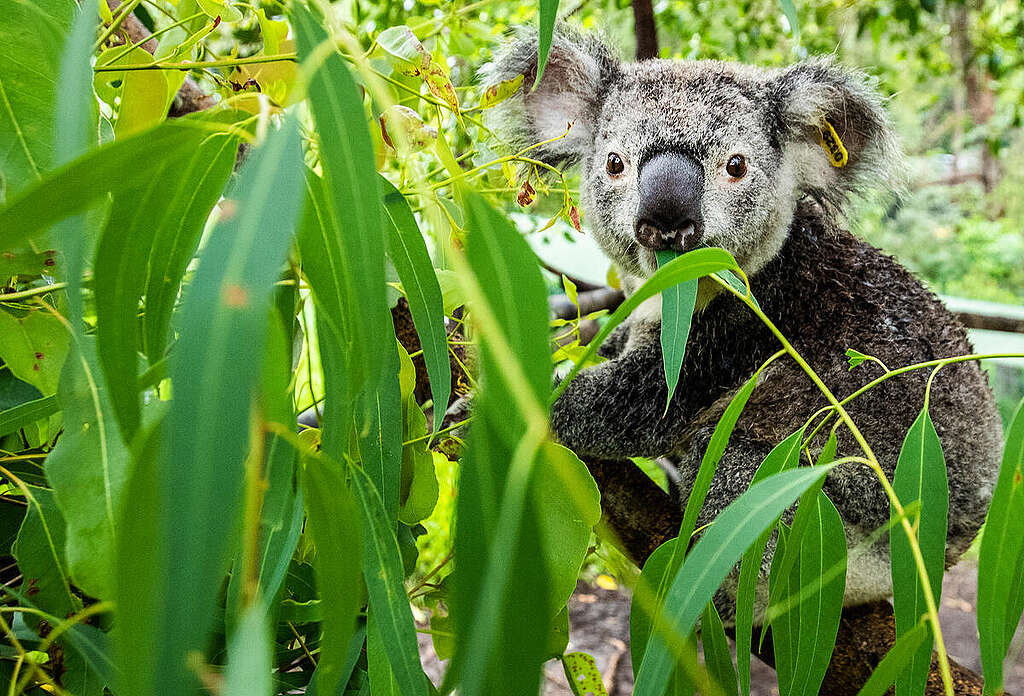Australian Deforestation
As Australians we love our unique native animals like the koala and cherish our country’s beautiful natural landscapes. But Australia’s status as a global leader in deforestation puts both our wildlife and our forests under threat.


This year is THE critical year for nature law reform, with the Australian government considering environmental protection laws that could deliver ambitious, once-in-a-generation reforms. But they won’t do it without our voices and our support.
The problem
Australia is undergoing a sustained, mostly hidden deforestation crisis on a global scale. Australia is listed among 24 global deforestation fronts — the only developed nation on the list, and alongside places like the Amazon, the Congo and Borneo. Currently deforestation kills tens of millions of native Australian animals each year, while harming the land, polluting rivers, contributing to climate change and damaging the Great Barrier Reef.


It’s time to fight for the future of our forests
In 2024 Greenpeace Australia Pacific is renewing our focus on combating deforestation in Australia; protecting our unique forests for the future; and, in turn, saving the lives of millions of vulnerable animals and birds.
Most of the deforestation is driven by the beef industry, so together with our vibrant community of supporters, we are calling for key supermarkets and fast food chains to commit to only sourcing beef without bulldozers..
We are also lobbying the Federal Government to bring in strong nature protection laws, as they consider historical legislation this year that could protect our Australian forests and wildlife for future generations.
Fight for our future. Fight for our forests.
Australia is a global deforestation hotspot
There is a hidden deforestation crisis underway in Australia and our iconic wildlife is under threat. Currently, an MCG-sized patch of forest and bushland is bulldozed every two minutes, with an average of 620 000 hectares lost every year for the past five years. This is deforestation on an unimaginable scale.
Australia is ranked second in the world for biodiversity loss, driven by the destruction of our forests and bushland, and putting our losses on a global scale alongside notorious hotspots like the Amazon and Borneo.
Deforestation threatens our unique animals
An estimated 50 million native animals are killed every year in Queensland and NSW alone as a result of deforestation. This means in Australia at least 1 animal is killed every second, of every day, of every year due to unnecessary deforestation.
Australia has a plethora of unique animals, birds and landscapes that are now under threat and endangered due to our deforestation crisis. Iconic animals, like our much beloved koala, are left homeless, injured, starving or killed from unregulated and unseen deforestation.
The destruction of our forests is fuelling the extinction crisis in Australia, and placing already threatened animals like the koala at further risk of harm. As a world leader in animal extinctions, Australia has a responsibility to halt deforestation and protect the places our wildlife call home and live up to our governmental promise of “No New Extinctions”.
The leading driver of deforestation in for pasture for beef
The majority of forest destruction in Australia is to create pastures for cattle, sold both in Australia and exported overseas. Beef sold to the biggest supermarkets and fast food chainsin Australia is one of the top drivers of deforestation in our country.
Our biggest sellers of beef must help end deforestation by committing to beef without bulldozers and only buying responsibly farmed beef. If the big corporations in Australia take action to change their practices, we can stop the destruction of native wildlife and the places they call home.
We need strong new nature protection laws
This year the Australian government will face a huge test — a once-in-a-generation overhaul of our national nature laws. Our Federal Government has already made commitments to end species extinction in Australia, but it is now time for them to follow through with their promises.
Without strong laws that genuinely protect and restore nature, the destruction of wildlife and forests will continue and countless more native animals will face extinction. Stronger legislation to safeguard our environment is a win for everyone — we urge the government to introduce the ambitious reforms needed to protect nature and to ensure a safe, liveable climate for all Australians.
Action on deforestation is action on climate change
As well as destroying our beautiful native forests and harming our unique Australian animals, deforestation also drives the climate crisisl. When the trees are bulldozed they are mostly left to rot or burnt, releasing huge amounts of carbon dioxide. So tackling deforestation not only protects our native wildlife, but plays an essential role in ensuring a safe, liveable climate for all Australians. Greenpeace estimates that in Australia deforestation accounts for an absolute bare minimum of 10% of domestic carbon emissions (it is difficult to get a precise figure as this is not properly measured by the Australian Government despite the large climate impacts)..
Instead of bulldozing our forests, Australia should play a world-leading role in forest regeneration and restoration, supporting farmers and Traditional Owners to do so. This would help soak up vast amounts of carbon dioxide out of the atmosphere while allowing threatened wildlife to thrive once more.
Frequently asked questions about deforestation
Greenpeace is asking corporations operating in Australia to commit to no deforestation or destruction of other natural ecosystems in the key products they produce or sell by the end of 2025 at the latest.
In particular we are asking corporations to prioritise ensuring the beef they produce or buy does not come from cattle operations where forests and natural ecosystems have been recently destroyed (since 2020). This is because beef is the number one driver of deforestation in Australia so tackling this issue quickly will have a big positive impact for our forests.
Well-known corporations such as McDonalds, Woolworths and Coles have a big role to play here so we are asking them to step up and help protect our forests and wildlife by refusing beef produced from deforestation.
Deforestation is the destruction of natural forest, including both never-before bulldozed forest and healthy regenerating or fully regenerated forest.
Greenpeace uses the definition of deforestation set out by a globally-recognised ethical supply chain organisation called the Accountability Framework Initiative. Major global sustainability and climate initiatives such as the Science-Based Targets Initiative also use this same framework.
Importantly, our asks of the Australian government and corporations is to halt both deforestation and the destruction of other non-forest natural ecosystems. The technical term used by the Accountability Framework Initiative to cover destruction of all ecosystem types is “conversion”. So really what we are asking for is for no more conversion of natural ecosystems, including no more deforestation of forests. It’s just that deforestation is far more understood by the public so we use this term to communicate the problem!
Cattle grazing for beef production is the leading cause of deforestation in Australia as forests and bushland are bulldozed to make way for vast cow paddocks. Around 70% of deforestation in Queensland – the hotspot in Australia – is for beef.
Sheep grazing is another driver, followed by logging to make paper and wood products. Mining, infrastructure and housing development are other drivers. While the local impacts of these developments can be severe, deforestation for beef dwarves all others in terms of the area of forest destroyed annually.
Much of the deforestation occurring in Australia is of regenerating or fully regenerated forest. While a never-before bulldozed forest will always be the best of the best, these recovering forests also have important values. They are slowly bringing back wildlife, stablising soils, and drawing down carbon out of the atmosphere. Allowing the bulldozers to destroy this regeneration kills the animals that have returned and sets back the clock for a long recovery once again.
It must be stressed that many types of forests are unable to recover at all following destruction by bulldozers and replacement with agricultural or other land uses. Where forests are sometimes able to regenerate, such as some Acacia species forests in Queensland, this is no excuse to start or continue bulldozing as the cumulative impacts on wildlife and the land are immense. Restoring any forest to a pre-bulldozed state is also very difficult and can take many decades, sometimes hundreds of years.
Yes, it is possible! We know cattle can be raised in Australia without bulldozing forests and in fact, the majority of beef produced in Australia is already deforestation-free.
But a minority of landholders, mostly in Queensland and New South Wales, are conducting large-scale deforestation for beef production — the majority without any oversight due to legal blindspots in our nature laws which allow areas considered threatened species habitat to be bulldozed.
At the moment, corporations like McDonald’s, Woolworths and Coles do not have adequate systems in place to rule out deforestation from their supply chains, meaning they are effectively hiding the deforestation in their products from consumers. This is not good enough and consumers deserve better.
Over the past decade there has been a wave of global commitments, both from corporations and governments, to eliminate deforestation. Given the growing demand for deforestation-free beef globally, and the deforestation risk associated with sourcing beef in Australia (and especially Queensland), major purchasers must lead the way with strong deforestation-free commitments and robust implementation plans, to ensure that customers in Australia and overseas can be confident they’re not supporting the destruction of our precious wildlife and forests.
Our Aussie farmers need to be fully supported to look after the land and protect and restore forests. This includes through government funds such as Queensland’s $500 million Land Restoration Fund and by the big corporations like McDonald’s, Woolworths and Coles who can use their vast profits to work with and support farmers to the right thing and pay a fair price for sustainable products.
Really it’s the large corporations like McDonald’s, Coles and Woolworths that need to act. They purchase the majority of beef domestically and make millions of dollars in profits and they need to take action to guarantee their products are not contributing to the destruction of Australian forests and wildlife.
Currently this is hidden from consumers, who are unaware that the beef on supermarket shelves or in their Big Mac could be contributing to the deaths of millions of native animals every year. It is imperative that solutions to this crisis are supported by companies linked to, or within, the Australian beef industry who can drive change.
Australia is one of the biggest consumers of meat per capita in the world and we know that consuming less meat is vital for the planet. But this is not just about people’s individual choices — given that beef production is a major driver of deforestation in Australia, it is imperative that solutions to this crisis are supported by corporations linked to, or within, the Australian beef industry. While meat alternatives and meat-free diets can help, we can’t rely on this alone to solve the deforestation problem. We need to force big corporations to take action.
Major purchasers of Australian beef like McDonald’s, Woolworths and Coles have a critical role to play in ensuring that their supply chains are not driving the destruction of our forests and threatening our wildlife. Right now, corporations like McDonald’s are hiding this from their customers, most of whom would be shocked to know that their Big Mac is fuelling the deforestation crisis and pushing threatened species like the koala to the brink of extinction. That’s why we’re calling on McDonald’s, as well as major beef purchasers like Coles and Woolies, to lead the way and commit to eliminating deforestation from their products.
This year the Australian government will face a huge test — a once-in-a-generation reform of our national environment law, the Environment Protection and Biodiversity Conservation Act 1999 (EPBC Act). Without strong laws that genuinely protect and restore nature, the destruction of wildlife and forests will continue and countless more native animals will face extinction.
Stronger legislation to safeguard our environment is a win for everyone — so Greenpeace is urging the government to introduce the ambitious reforms needed to protect nature and to ensure a safe, liveable climate for all Australians.
The reforms must address Australia’s rampant deforestation, particularly from the beef and logging industries. This will be a key test and Greenpeace and our supporters will be pushing hard to make sure this happens.
The renewable energy transition presents enormous opportunities for Australia to reduce our emissions, create the clean jobs of the future and replace fossil fuels in our economy. We must avoid the destructive practices seen with the fossil fuel industry and ensure that these projects are designed in a way that benefits local communities, are developed in partnership with Traditional Owners, and undergo the strictest environmental assessments, including ensuring no destruction of important forests. When done correctly, these project can actually provide a net positive benefit to nature — and that’s what we should be striving for.
The primary driver for Australia’s globally-significant deforestation rates, focussed heavily in Queensland, is bulldozing to make way for pasture for beef cattle. Native forest logging is another key driver, particularly in New South Wales and Tasmania. Half of Australia’s forests have been lost and the continued logging of our native forests endangers species like the Koala, Greater Glider and other threatened species.
Professor David Lindenmayer, Fenner School of Environment and Society, Australian National University said: “All scientific economic and social data show that native forest logging is environmentally, economically and socially bankrupt. We have to make a rapid transition to a plantation-only industry.”
You can help bring an end to the destruction of our forests
Your ongoing support is the most effective way to contribute by helping us with long term campaign strategies.
Keep informed
Together we are part of a growing, global movement determined to bring about the changes our planet desperately needs. Sign up to receive updates on our campaigns.
